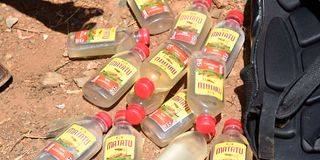Hard times push Kenyans to cheap and traditional liquor: Report

Chang’aa packaged in used second generation liquor bottles impounded at Kamukunji Estate in Eldoret town in this past photo.
A new report by the National Authority for the Campaign Against Alcohol and Drug Abuse (Nacada) reveals that Kenyans are increasingly going for cheaper alcoholic drinks such as chang’aa, traditional brews and potable spirits, likely fueled by the hard economic times.
The report detailed that Western region had the highest numbers of people consuming chang’aa (11.4 per cent) followed by Nyanza (6.3 per cent) and Rift Valley (3.6 per cent.)
Western region also led in the use of traditional liquor (12.9 per cent), followed by the Coastal region (7.4 per cent) and Nyanza (2.2 per cent.)
Central region recorded the highest numbers of people consuming potable spirits (4.1 per cent) followed by the Coast region with 3.2 per cent, and Rift Valley with 3.1 per cent.
Kenyans also said they felt that the production and consumption of illicit brews, including chang’aa, had increased in their regions, as well as establishment of more bars within the last five years.
“Kenyans had the perception that production and consumption of illicit brews was widespread in their community with Western region recording the highest perception level followed by Nyanza and Rift Valley. 48.5 per cent of Kenyans had the perception that there was an increase in the number of bars in the last five years in their community with Central region recording the highest perception level followed by Nairobi and Eastern,” read the report in part.
In a bid to curb the rising numbers, Nacada is calling on the national and county governments to tighten its operation on the production, distribution sale of illicit brew. It is also calling for regulation in ethanol handling, which may include a special tax to manufacturers of potable spirits.
Nacada is also calling upon the Kenya Bureau of Standards (Kebs) to “review standards for alcoholic drinks to regulate the potency of cheap and readily available liquor in the market” and for the Health ministry to manage health disorders resulting from substance abuse, by ensuring that those that are addicted are able to access treatment and rehabilitation.





